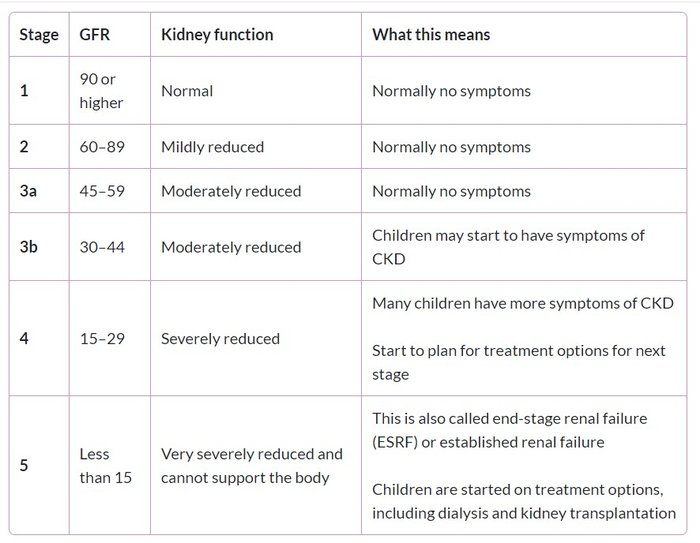Stages
There are five stages of CKD. (Stage 3 is often split into two – stages 3a and 3b.) However, many children with CKD do not progress through all stages. Other children progress through all stages, but how quickly this happens is different for each child.
Stages 1 and 2 (mild CKD)
In stage 1, the kidney function is normal, but there are other signs of kidney disease – one or both kidneys may be small or different than normal, or the kidneys may leak protein into the urine (wee). In stage 2, the kidney function slowly gets worse, though there are usually no symptoms.
Children need to go to follow-up appointments to find out whether their kidney function changes. They may need to take medicines or make small changes to their diet to manage any symptoms and, sometimes, to help prevent or slow down the progression to later stages of CKD.
Stage 3a and 3b (moderate CKD)
In stage 3a, the kidney function gets a little worse. In stage 3b, children may have more symptoms that are associated with the worsening kidney function.
Children need to go to follow-up appointments for tests. They often need to change the types or doses (amounts) of medicines as they progress through these stages. They may need to eat less of some types of foods, and sometimes drink fewer fluids, including water and juice.
Stage 4 (severe CKD)
In stage 4, the kidney function is severely reduced. Children continue to receive treatment for symptoms as needed.
Stage 5 (kidney failure)
In stage 5, the kidney function is very low, and the kidneys can no longer support the body – this is called kidney failure. This stage is sometimes called end-stage renal failure (ESRF) or established renal failure (ERF). It usually takes years for a child with CKD to reach stage 5. However, this varies among children. Stage 5 occasionally happens when a child is young, but is more likely to occur later in life, especially during puberty when children’s bodies grow quickly, or in adulthood.
Children need specialist treatment at this stage. Many children need dialysis, which uses special equipment to remove waste products and extra water from their body. The best treatment is a kidney transplant, in which a healthy kidney from another person is transplanted into a patient’s body. After a successful kidney transplant, children can live full and healthy lives, but will need to take medicines to look after the new kidney.
